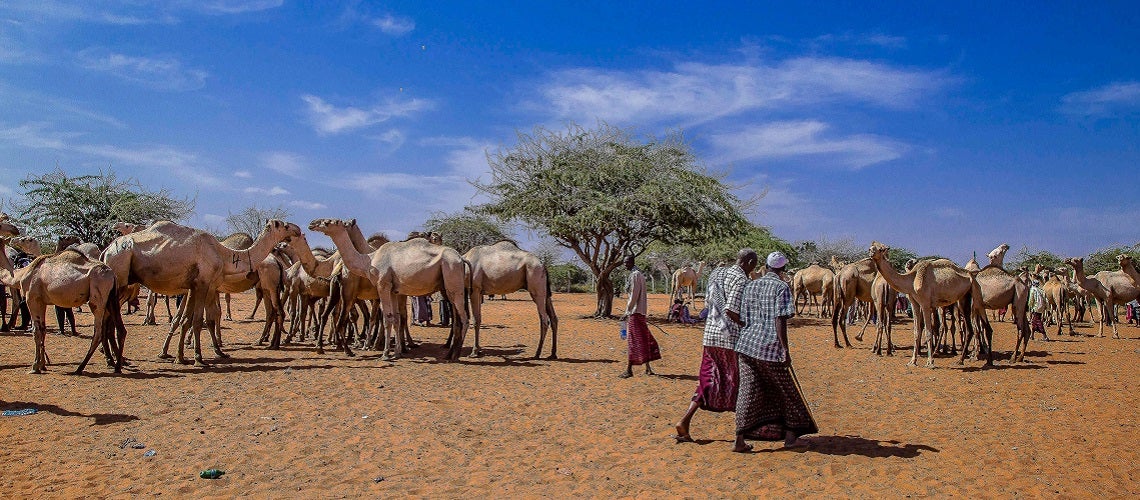 Pastoralists at the camel market in Wajir town, Kenya
Pastoralists at the camel market in Wajir town, Kenya
Global spending on climate change is nearing US$1 trillion annually. To optimize the benefit of these climate investments, transparency, equity, and inclusion must be at the heart of climate finance decision-making. We need green accountability – an approach recognizing that effectively addressing the climate crisis requires harnessing the insights and agency of those most affected by climate impacts. In developing countries where a sevenfold increase in climate finance is needed, green accountability calls for systemic ways for people to have a voice and role in climate decisions that most impact their lives. Citizens and civil society must be at the center of climate finance to direct funding, implement solutions, and hold decision-makers accountable for effective and equitable climate action. The Global Partnership for Social Accountability (GPSA) is expanding opportunities to demonstrate how civic engagement and civil society leadership can improve development outcomes from climate finance and action -- both for mitigation and adaptation.
Creating systems for accountable climate finance
We envision a world where climate finance not only succeeds in reducing carbon emissions but also addresses inequality and exclusion. By adopting a joint approach that considers both the supply and demand side of governance, we can reduce carbon emissions, build resilience, and pave the way for more inclusive and sustainable growth. Civil society, with its expertise, can play a crucial role in co-creating systems for accountable climate finance.
We need a participatory and transparent architecture for climate finance that truly puts people at the center of the agenda. Throughout history, large sudden flows of financing, such as those following oil discoveries, have often failed to benefit vulnerable communities and led to increased capture and corruption. In lower-income countries, total projected climate spending over the next decade will surpass annual GDP by more than tenfold in some cases. However, existing transparency guidelines under the Paris Agreement and accountability standards are not built to govern the large influx of climate financing. This is particularly true for large-scale green infrastructure financing.
To achieve sustained and impactful deployment of greatly scaled climate finance, we need to focus on both the supply and demand sides of governance. On the supply side, governments could strengthen policies, regulations, and institutions such as supreme audit institutions to ensure transparency and accountability in climate finance allocation and expenditure. Governments could, like in Bangladesh, prepare Citizen Climate Budget Reports that make information on climate expenditure more accessible and transparent for the public by utilizing climate budget tagging. It will also be vital for governments to set up strong grievance redress mechanisms to address accountability issues arising from the implementation of climate and environmental policies.
"We need a participatory and transparent architecture for climate finance that truly puts people at the center of the agenda."
Direct citizen engagement on the demand side should have several prongs. First, civil society can monitor where climate finance goes. Here, we can learn from groups like the Climate Finance Group for Latin America, which has pioneered ways of tracking climate finance to empower communities to demand more and faster climate action. Civil society can verify end-uses and inform effective local implementation, which is often a missing link in the accountability chain. Citizens should also be part of the planning of projects at earlier stages. This requires robust and well-resourced feedback loops, as well as the capacity for governments and private sector actors to assimilate feedback into resource allocation and action. Here, digital innovations can play a key role to scale engagement: the capacity now exists to aggregate information systematically from citizen feedback and open data sources. Artificial intelligence and machine learning approaches can produce real-time curated insights to shape climate finance to be responsive to citizen needs and ensure the quality of outcomes. The World Bank can facilitate cooperation and systematically integrate feedback loops into the financing ecosystem.
Anchoring adaptation within local communities
In addition to monitoring and tracking, green accountability empowers communities for more open and collaborative institutions. In adaptation, projects could be designed with dual-use capacity to benefit recipient communities in multiple ways; for example, building cyclone shelters that also act as community centers. This would increase local ownership in completion of these projects. Communities are then more likely to use informal relationships and networks to constrain corruption by contractors. These policy considerations are also captured in the Principles for Locally Led Adaptation. They anchor adaptation within local communities and put communities in charge of designing and implementing adaptation projects. With support from the World Bank, these principles are for the first time being piloted on a national scale in Kenya.
Finally, as we work to enhance accountability and empower communities, we must recognize the vast expertise within civil society that has already proven its ability to effectively engage in climate action at the community level. For example, reforesting millions of hectares cannot be achieved without the specialized local knowledge, active participation, and oversight of local communities and indigenous groups. By valuing and harnessing this expertise, we can achieve climate solutions that are rooted in the unique perspectives of local communities. In Latin America and the Caribbean, the ground-breaking Escazu Agreement, in 2018, enshrined access to information, public participation and justice in environmental matters for everyone across the region. Supported by the GPSA, CSOs in Kosovo are working collaboratively with the government to improve transparency and data-driven decision-making in the green transition.
The World Bank and the GPSA are committed to supporting civil society engagement in the climate sector, and our early pilots are already yielding promising results. In collaboration with the Transparency and Accountability Initiative, Accountability Lab, and the French Development Agency (AFD), the GPSA will launch a Call for Proposals this month to establish an ecosystem of green accountability initiatives. Our goal is to build upon existing civil society-led activities and explore innovative methods for ensuring socially accountable climate action that puts people at the heart of the agenda. As this agenda scales, we aim to support the convergence around a set of green accountability principles to guide our collective efforts.





Join the Conversation